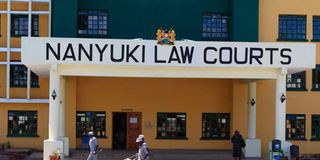Landmark ruling opens floodgates to lawsuits against British Army

Nanyuki Law Courts. The court ruled that it has jurisdiction to determine suit pitting British Army against Lolldaiga community.
The British Army is staring at a flood of lawsuits after a Nanyuki Court ruled that signing a defense contract with Kenya does not make it immune against prosecution.
The Environmental and Land Court said Kenyan courts have jurisdiction to hear and determine criminal and civil matters involving British soldiers.
In the landmark ruling delivered by Justice Antonina Kossy Bor against the British Army Training Unit in Kenya (Batuk), Kenyans and local authorities can now sue British soldiers and the British Army.
The ruling yesterday showed the United Kingdom (UK) government had waived its state immunity by signing the Defence Cooperation Agreement (DCA) in 2016.
The ruling comes as Batuk faces a series of crises emerging from disciplinary issues.
The ruling, anchored on the DCA, gives power to communities and local authorities to sue and prosecute the British Army.
She made the ruling in a case brought by the Lolldaiga community following a fire sparked by training exercises involving British soldiers.
The community sued together with the environmental group African Centre for Corrective and Preventive Action, seeking compensation for the fire at the Lolldaiga Hills Conservancy on March 25, 2021.
The fire prompted wildlife from the conservancy to escape into peoples’ farms and destroy crops, while the smoke that contained dangerous chemicals caused adverse health effects on people and livestock.
But in her ruling, Justice Bor said that even though local courts had the jurisdiction to determine matters involving Batuk, the petitioners had not exhausted all dispute resolution mechanisms provided for under DCA.
“In this matter, I agree with the respondents, Batuk, and Lolldaiga Hills Ltd that the petitioners moved to court before lodging their complaints to the alternative dispute resolution mechanisms in the agreement,” she said.
Inter-governmental Committee
She directed that the matter be taken to the Inter-governmental Liaison Committee.
The DCA stipulates that all civil matters be heard before the committee, which comprises members of the UK and Kenyan governments.
The committee is tasked with determining if and how much to compensate victims affected by Batuk acts.
She also issued guidelines on how the dispute is to be resolved before the committee.
She directed the relevant government authorities in both countries to investigate the claims made in the lawsuit.
“Both authorities will also be required to collect and produce the evidence in accordance with Article 11 of the DCA before presenting it to the committee,” she said.
The judge also ordered the committee to meet in Kenya with a view of establishing whether Batuk, its members, employees or agents are liable for the claims made by the petitioners.
She said that if the committee establishes that the soldiers are liable for the claims, the relevant authorities in Kenya will be required to submit a report to their counterparts in the UK.
“The UK government will then pay prompt and adequate compensation to the petitioners as provided in Article 11 of the DCA,” the judge said.
She added: “A copy of the settlement of the dispute is to be filed before the court within 14 days from the date of the determination of the dispute by the committee,” Justice Bor said.
The ruling means that if the parties are unable to resolve the issues under DCA, the petitioners will be at liberty to move back to court.
Lolldaiga community lawyer Kelvin Kubai said the dispute will be lodged before the committee after the court issues copies of the ruling this week.
Justice Bor, who delivered the decision last week, said copies of the ruling will be ready for the parties to collect this week.
Gabriel Gatta, a member of the Lolldaiga community, said the court decision signified an end to their untold suffering.
Following the fire at the Lolldaiga conservancy last year, he said, elephants have been camping at his nearby farm.
He also said the communities’ livestock had also experienced complicated health issues because of the explosives used in the military training exercises.
“We hope that the Inter-governmental Liaison committee will ask the British Army to pay for our hospital expenses for the illnesses that they have caused,” Mr Gatta said.
He said that the court decision will also help ensure that the British Army is cautious about its actions.
The presence of Batuk in Nanyuki has created several job opportunities for locals.
But Mr Gatta said that most residents who work at the barracks often fall sick because of exposure to dangerous chemicals used during training.
“We always suspect that the military officers have a way of preventing themselves from getting exposed to the chemicals, leaving us at their mercy,” he says.
The British government has maintained its commitment to sustaining amicable relations with Kenya and local communities.
“We remain committed to upholding a good relationship with the local communities and the Kenyan military as per the DCA. We benefit from the training environment and the locals benefit from the economic partnerships with our troops,” Brigadier Ronnie Western, the defence adviser to the British High Commission, told the Nation.





